Bohemian Killing Review – great idea with poor delivery
We’ve looked into the case of Alfred Ethon, the main actor of the legal drama by Polish developer, The Moonwalls. Does Phoenix Wright have anything to be afraid of?
The review is based on the PC version.
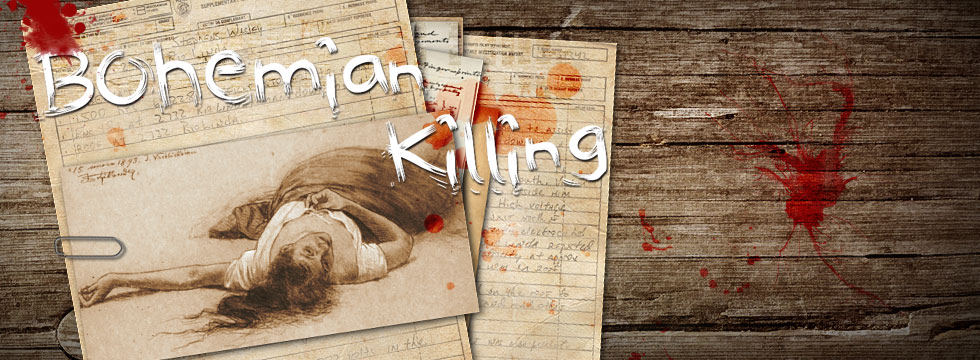
- Original gameplay idea;
- Rather good-looking locations;
- Decent audio.
- Repetitiveness multiplies boredom;
- Dull plot and characters;
- Crude and simplistic mechanics;
- Slew of technical shortcomings.
This was supposed to be the Polish answer to Phoenix Wright: a legal drama in the form of a walking simulator, at once mysterious and obvious; a Stéphane Cornicard-narrated thriller, touching upon important social issues; finally, a fresh production, devised as a potential hit. A game like this can’t be simply “good”... and it definitely isn’t. Not only is it hard to call Bohemian Killing a good game; calling it mediocre would be a stretch, since in many aspects the game doesn’t even reach that level. It rather seems to confirm that even the best idea can be slaughtered in cold blood by poor delivery, and I don’t even need a lawyer to prove this. But let’s not get ahead of ourselves.
First, I walked up the stairs
The very concept of the story is quite creative. The protagonist, Alfred Ethon, is an inventor of Romany descent. He murders Maria Capet, which earns him a trial – these are the facts. At the very beginning of the game, the player – by virtual hands of Ethon – kills the woman, and so his guilt is beyond any doubt. The judge suspects as much, but – contrary to the player – is not entirely sure. The task of our anti-hero, as long as he’s not swinging on the gallows pole, is – quite understandably – not to shed any light on the case, but quite the opposite – to produce as much smoke and as many mirrors as he can, and by doing so, to convince the judge that the only liar here is the prosecutor. That’s where the real game starts. There are two timelines: the first takes place in the courtroom; in the course of the other, retrospective one, the player controls Ethon, and tries to “reconstruct” the events in such a way so as to prove his innocence. Sounds intriguing, right? Unfortunately, not much beyond that.
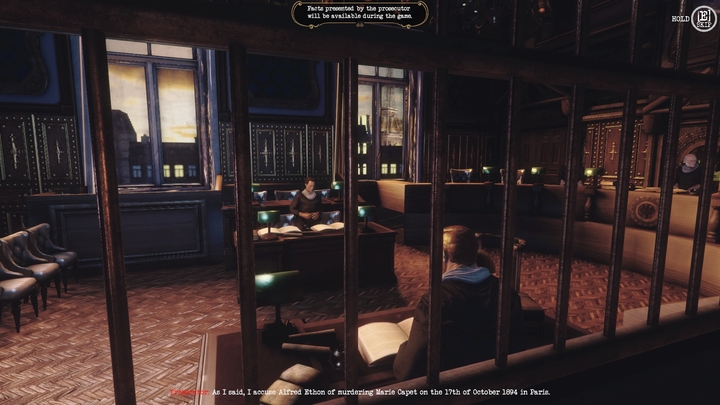
The plot is not in the least engaging, and the characters are flat and boring effigies that lack any solid motivation or character traits that could make them that tiny bit more interesting. I thought my hope for some psychological depth of the protagonist was not without grounds, but the man himself proved me wrong – all Ethon does is brag about his genius and the mental impairment of the judge who cannot comprehend the mastery of his inventions, mentioning once in a while that it is his ethnicity that causes the bias against him. Such an approach nullifies even the slightest potential that some plotlines might have been holding. I sometimes felt that the game was making an effort to tackle the problem of racial discrimination in the post-revolutionary France, especially emphasizing the hostility towards Roma people. Which could actually work if only the main character weren’t a painfully stereotypical Romany who first kills a young socialist, and then tries to lie his way out of trouble.

The Hitchcock-like earthquake that opens the game is not engaging. What’s worse, it’s actually quite repelling, once the player realizes how badly it narrows the gameplay. I was fed up with the game after my second approach, in which I managed to defend myself against the accusations of the prosecutor and come close to clearing my name entirely. Revealing the ending not only eliminates all the suspense, but also results in the lack of interest in the rest of the game – instead of thinking that everything can be changed, the player knows that the only thing they can alter is in fact the final sentence. The only thing left to do is to patiently test new approaches and tediously plan – all over again – the next move without any degree of certainty that our efforts won’t go in vain.
Then I used the stairs
The greatest issues of Bohemian Killing are its repetitiveness and faulty mechanics. The first one could be considered an advantage; the developers said that the whole game is based on this concept. Indeed, the idea itself is quite interesting, and the fact that the game requires multiple approaches to the story in order to outplay the judge is pretty appealing, at least theoretically. There’s an obstacle on the way, however, that The Moonwalls studio could not overcome – there is the proverbial stick, but no carrot. Almost every aspect of this game discourages us from going again – starting from the story, through the mechanics and technical flaws, and ending with the lack of a proper reward at the end. My patience for discovering new paths was irretrievably lost when I heard Ethon say for the hundredth time that he “went up the stairs” (the protagonist is hell-bent on informing the judge about every minuscule activity he performed during the night). Since I already knew the outcome of his actions, I soon lost any interest in continuing the game, even when I had a chance to discover some new element of the plot.
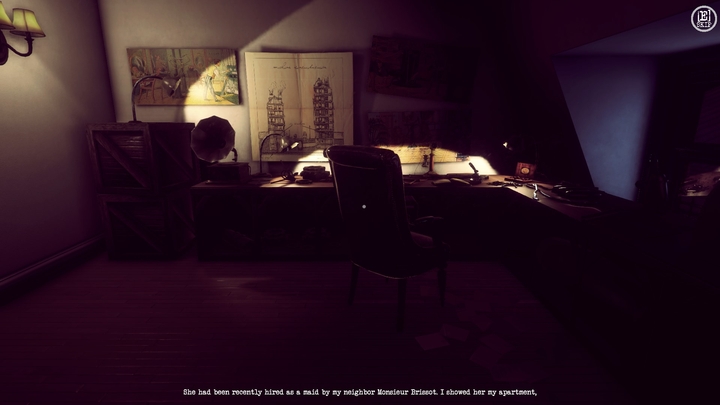
My first approach (apart from learning the unfriendly interface) was a lesson in mechanics, and the way the game handles the consequences of the player’s actions. One of the most advertised elements of the game was its non-linearity, and the ability to interact with “almost every part of the environment”. The former was supposed to provide multiple unique playthrough possibilities, ensured by many available paths and many different outcomes. In reality, the extent to which the player can influence the story is pretty limited, and actually rather linear. There is of course some room for extreme choices such as going to sleep right after the beginning of the game, or an option to simply plead guilty, but other, more indirect paths (such as framing our neighbor) boil down to pretty much one and the same result, which is the reduction of the final sentence. So much for finesse.

The interactivity here means clicking through different objects, mostly in order to include them in the evidence that could prove Ethon innocent (although gathering the evidence doesn’t necessarily mean that the sentence will be any lighter). Some of the objects are used to move time forward – maintaining the chronology and the right tempo of the events is very important from the prosecutor’s POV. Unfortunately, that’s where the interaction ends, leaving us with the unfulfilled promise of greater variety.
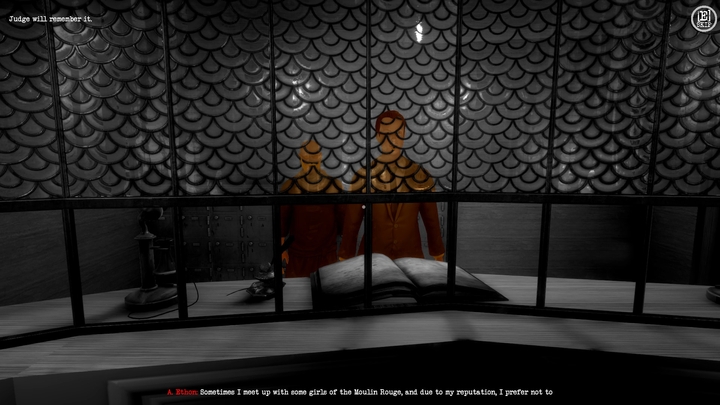
Bohemian Killing is first and foremost a walking simulator, and it tries really hard to convince us – and seemingly itself as well – of that fact. How can it be that Gone Home, in which nothing ever happens apart from unraveling the story, was far more memorable thanks to the atmosphere alone? Why does Bohemian Killing fail? The answer is simple – the game by The Moonwalls lacks soul, general direction, and depth, and it can’t even justify why the game was designed the way it was. Walking (which feels more like swimming), the most important element of mechanics, is plagued by tons of bugs – sometimes the character locks in place for no reason, other times he can’t move forward or backwards. I wouldn’t even mention such glitches if only they could be amended by a simple restart, but that never helped, forcing me to start all over again.
The loading screens, which shouldn’t even exist in such a small game, interrupt the pace. Pressing pause during a cut scene results in the whole scene being rewound, and if you try to skip a dialogue line during a conversation, the whole conversation will be skipped instead. You can either listen to the entire thing or not listen at all – there’s no other option.
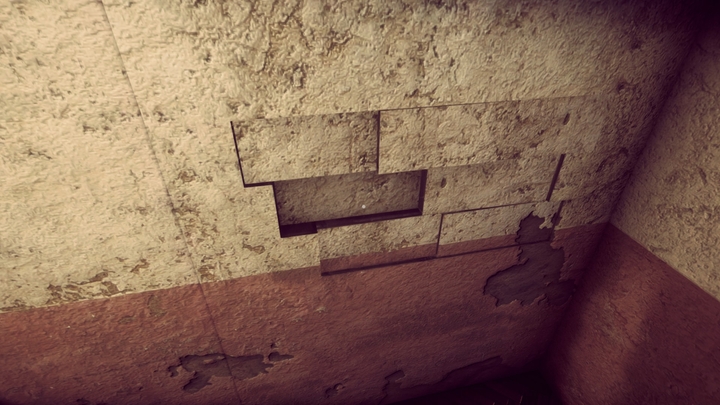
And finally, I walked down the stairs
What’s left is the audiovisuals. The (presumably) picturesque neighborhood where the protagonist ends up, although it has its moments, is generally rather empty. Only occasionally do we encounter some ugly models of key characters in this place the size of a quarter of a hub from Deux Ex: Human Revolution. There is virtually no design effort put in this game – it’s supposed to be a steampunk universe, but there’s no evidence of that anywhere, perhaps save for unnaturally shining elements of the environment. The appearance of some locations somehow manages to save the situation – some of them are actually quite nice, if you manage to ignore certain graphical shortcomings, that is.
Luckily, the situation with the audio is somewhat better. The soundtrack by Marcin Maslanka, if a bit ascetic, sounds good, and leaves no doubt that the story takes place in Paris. The voice-over by Stéphane Cornicard (Ethon) also does the job, but it’s hard to say that it’s outstanding.
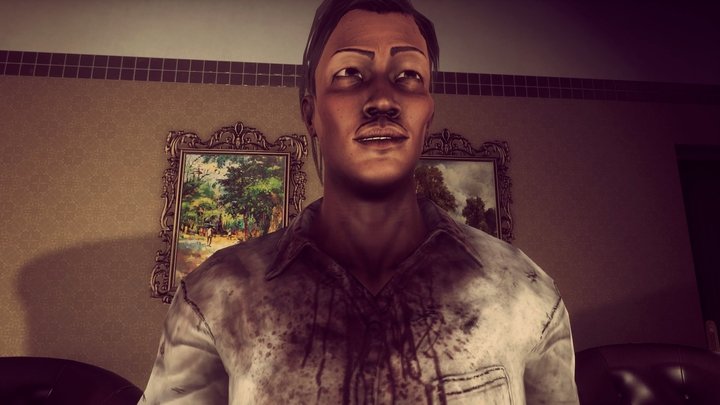
Life imprisonment
I don’t know what’s to blame – insufficient funding, too much confidence and ambition, or perhaps a combination of both? The fact remains that Bohemian Killing would be better off as a free browser game (perhaps this would even work in its favor). In its current state, I can’t recommend buying it. The game by Marcin Makaj is – contrary to its advertising lines – a game for one playthrough. When writing this review, I felt as if I was trying out a demo, a part of something bigger and something more serious. In Bohemian Killing the omnipresent shortcomings hurt the otherwise innocent and promising idea. If you treat the first approach to the game as a tutorial, and manage to unlock one of the eight endings during the second playthrough, you will probably see that there’s not much left to do. I really wish I didn’t have to pass a judgement like that.
Bohemian Killing
Bohemian Killing Review – great idea with poor delivery
We’ve looked into the case of Alfred Ethon, the main actor of the legal drama by Polish developer, The Moonwalls. Does Phoenix Wright have anything to be afraid of?

